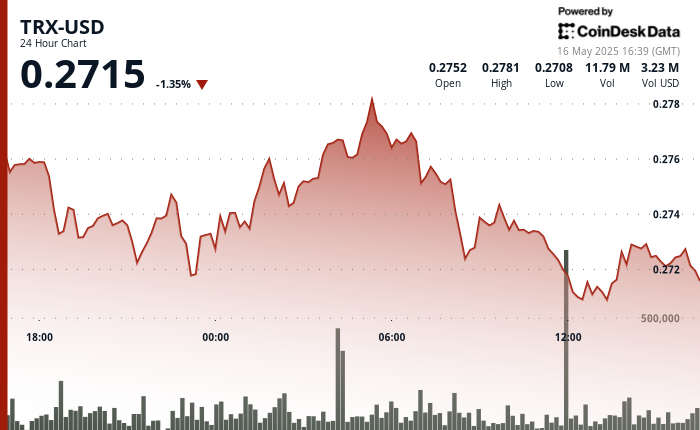Leemon Baird on Hedera's Technical Gambit and AI’s Future


Leemon Baird's Vision for Hedera's Technological Innovation and the Future of AI
At Consensus 2025, Leemon Baird, the co-founder of Hedera, shared his insights on the groundbreaking advancements in technology that he believes will dwarf even the impact of the Industrial Revolution. In an interview with Afra Wang, Baird discussed his journey from pioneering hashgraph consensus in 2016 to establishing Hedera as a leading player in the distributed ledger space.
Baird's expertise spans both academia and industry, with a background in computer science. He emphasized how Hedera's approach offers ultimate speed and security through ABFT while being environmentally friendly through proof of stake consensus. Addressing governance concerns, Baird highlighted the importance of trustlessness in systems.
He outlined key areas where Hedera is making waves: AI governance and control mechanisms, real-world asset tokenization like gold and carbon credits on its platform, and stablecoin development for mainstream adoption. Highlighting their commitment to sustainability, Baird noted that Hedera has been conscious of energy consumption since its inception.
Leemon Baird on Hedera's Technical Gambit and AI’s Future
The co-founder of Hedera, a speaker at Consensus 2025, says today’s technological advances “will make the Industrial Revolution look minor in comparison.” Interview with Afra Wang.
The convergence of AI and blockchain holds immense potential according to Baird. From predicting breakthroughs like AlphaGo's victory to being astounded by ChatGPT and Large Language Models (LLMs), he sees these advancements reshaping industries like never before. With humanoid robots poised to revolutionize skilled trades with conversational abilities powered by LLMs, Baird foresees these innovations overshadowing past revolutions in human history.
Afra Wang, an accomplished freelance writer specializing in AI and crypto topics, conducted this enlightening interview with Leemon Baird. Wang's educational background includes a focus on international history at prestigious institutions like Columbia University and the London School of Economics. Her insightful newsletter Concurret delves into tech trends while her personal website showcases her diverse portfolio at afra.work.
This thought-provoking discussion sheds light on how cutting-edge technologies are paving the way for unprecedented changes across various sectors—a glimpse into a future where innovation reigns supreme.
I started working on this in 2012 as one of many math problems I was exploring. Initially, I was convinced it couldn't be done. I'd pick up the problem, play with it, and convince myself it was impossible—over and over again. But in 2015, I realized that by throwing in two hashes, suddenly it all falls into place. You can have ultimate speed—essentially at the speed of the internet—while also having ultimate security with ABFT. And it's proof of stake, so you don't waste electricity.

It was about addressing the fundamental question: what do you really want in governance? What will give you true trustlessness, or at least a lower bar of trust needed to fully trust the system? That was our answer—approaching business questions with the same rigor as mathematical ones.
Baird: I would highlight four key areas:
First, AI is extremely exciting right now. The dangers of AI are also concerning, which is why we need to establish provenance, governance, and version control for AIs. People need to know if they can trust what's happening. Hedera helps with AI in multiple ways, including permissioning data and potentially handling royalties for people providing training data. The work that EQTY Lab is doing with NVIDIA and Intel on Hedera is particularly exciting.
Second, real-world asset tokenization is transforming how we handle valuable assets. We have numerous projects tokenizing real estate, gold, diamonds, carbon credits, and even carbon emissions on Hedera. From the beginning of blockchain technology, I've maintained that what's important isn't pictures of monkeys or games—it's that all things of value on the planet will ultimately be put onto these ledgers.
Third, stablecoins are essential if you want real-world adoption. We've created a Stable Coin Studio to make stablecoin development easy on Hedera. The Hedera Council includes many financial institutions doing impressive work with stablecoins.
Baird: We've been thoughtful about energy consumption from the very beginning. Everything—from our algorithms to how nodes are run and governed, and the fact that we use proof of stake instead of proof of work—laid the foundation for low emissions from day one.
This created a virtuous cycle. Early adopters looking to tokenize carbon credits chose the green blockchain. Then, people who wanted to tokenize emissions and credits wanted to use the same blockchain where everyone else was doing similar work. This flywheel effect has made Hedera perhaps the most popular blockchain in the green technology space.

Baird: The intersection of AI and blockchain is more significant than most people realize. On Hedera, we're seeing real traction in several areas:
Baird: Many AI developments have unfolded exactly as I expected. When AlphaGo defeated the world's Go champion, when AlphaZero mastered chess, when AIs conquered poker—I had anticipated all of it. They even used nearly the same techniques I'd envisioned. We simply needed faster computers.
But ChatGPT and Large Language Models (LLMs) have utterly astonished me. The transformer architecture from 2017—described in the paper "Attention is All You Need"—represented a breakthrough that no one could have anticipated. Back in the 90s, we were completely stumped by language processing—trying various approaches, but failing at every turn.
The capabilities of today's LLMs still astound me, and their future remains unpredictable. Will they reach superintelligence? Or will they hit a ceiling? I don't know—and I'd contend that nobody does.
Humanoid robots have also surpassed expectations. While their physical development has matched my predictions, their conversational abilities—powered by LLMs—have far exceeded what I imagined possible. In the coming years, they'll begin with basic factory work before advancing to skilled trades like welding, plumbing, and electrical work.
These technological advances will make the Industrial Revolution look minor in comparison. Most people haven't grasped the magnitude of these changes or how rapidly they're approaching.
Afra Wang is a freelance writer and journalist with working experience in AI and crypto. She previously studied international history at Columbia University and the London School of Economics. Afra writes a newsletter called Concurret, and her personal website can be found at afra.work.



